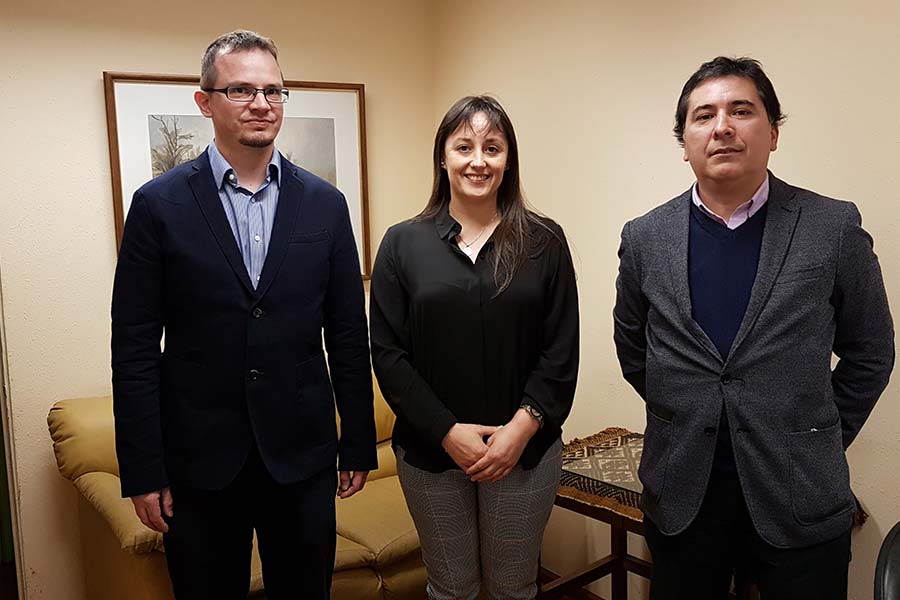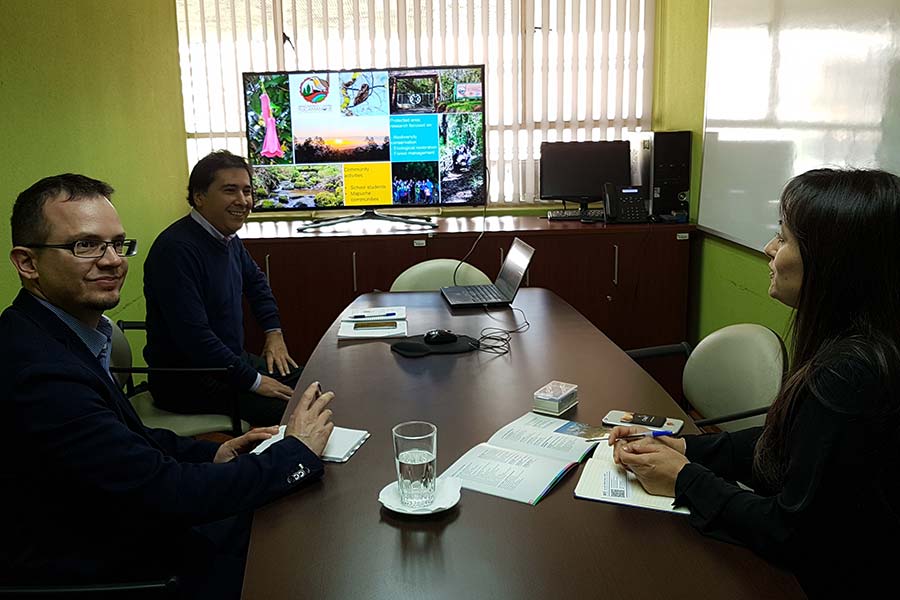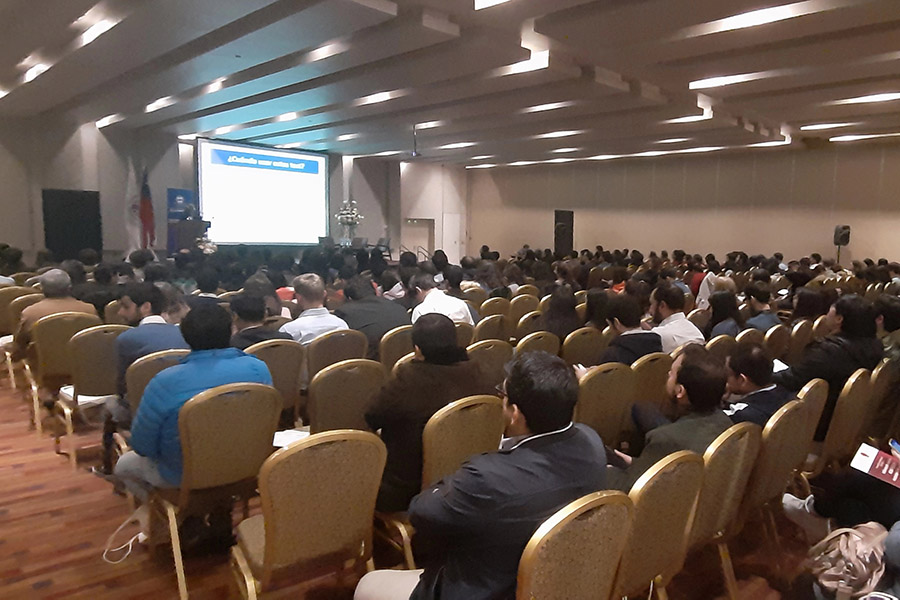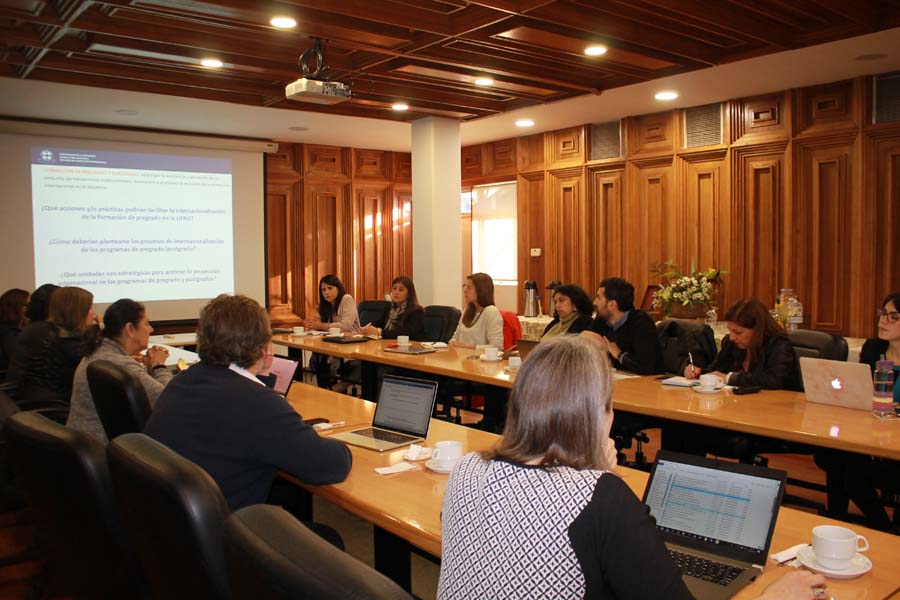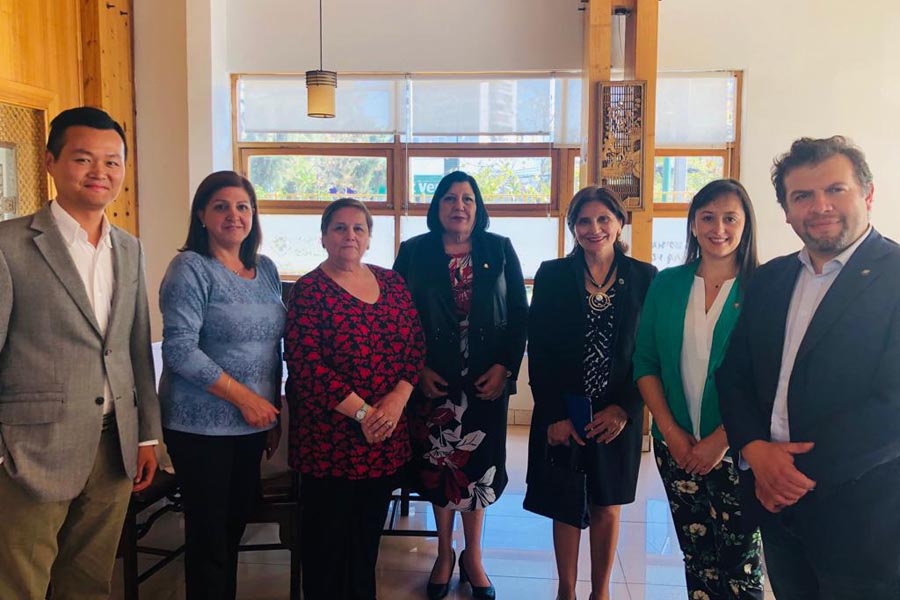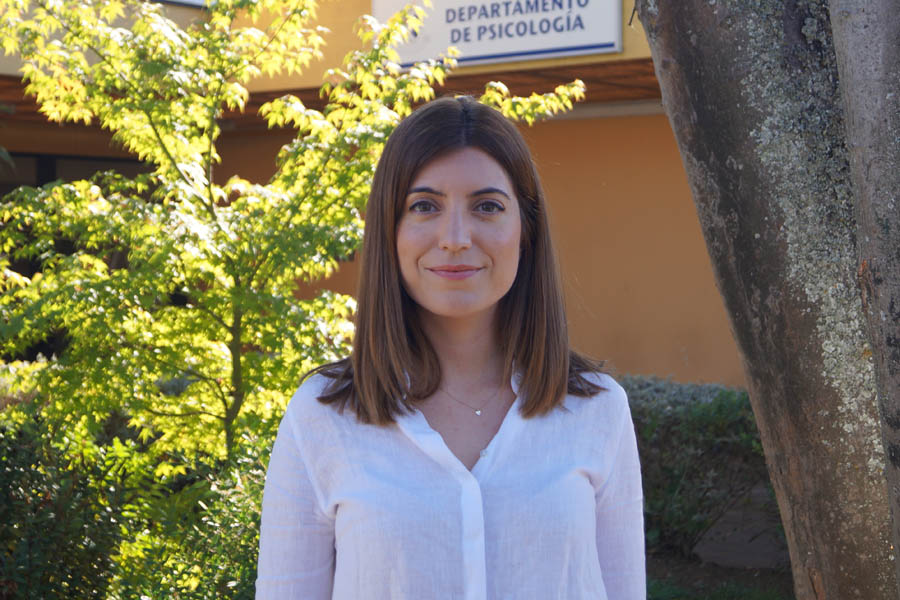|
This first meeting with a representative of the Czech university strengthens the important alliance with Learn Chile, which the UFRO is part of since several years. |
Dr. Michal Kuraz of the Czech University of Life Sciences in Prague came together with Dr. Adison Altamirano, the Vice-dean of the Faculty of Agricultural and Forestry Science, and Dr. Pamela Leal, who is in charge of Outreach and International Contacts at the Universidad de La Frontera. It was a first approach that started with the interest shown by the Czech university in getting to know the work of the Universidad de La Frontera in order to find new possibilities for cooperation, student exchange and research projects with Chile. Dr. Pamela Leal explained that Dr. Kuraz was interested in the work of the undergraduate and graduate programs and in the field of research at the Universidad de La Frontera, as well as in the possibility of an exchange of students and academics through the Erasmus Plus program of the European Union. “Our mutual fields of interest are engineering and agrobiology. In this context, it will be key to keep in touch with the Scientific and Technological Bioresource Nucleus BIOREN and the Faculty of Engineering,” she said. One of the main issues they addressed was the irrigation and optimization of water use in agricultural production. In this regard, Dr. Adison Altamirano stated: “This Czech university is quite advanced in mathematical modeling applied to the optimization of water resources, especially in regions where water is limited. In this context, the Araucania Region seems very interesting, since our water resources are also limited and new plantations, for example of fruit trees, have been established.” Dr. Kuraz also showed great interest in the UFRO Faculty of Agricultural and Forestry Science, especially because of the doctoral programs that favor research in the fields of natural resources, agri-food sciences and the environment. In the future, it would also be possible to do joint projects, to obtain financial support and to start short-term or middle-term visits and student exchange.
 Written by: UFRO Communications Office Written by: UFRO Communications OfficeThis email address is being protected from spambots. You need JavaScript enabled to view it. |
|
About 400 participants got together at the Convention Center of the Dreams Hotel in Temuco, Chile, to deepen their knowledge at the 26th Conference on Internal Medicine, a traditional event that was organized by the UFRO Department of Internal Medicine, with the support of the German Clinics (Clínica Alemana) of Temuco and Santiago. |
National and international guests came together at this new version of the annual Conference on Internal Medicine of the Universidad de La Frontera, which is only one of the academic events the UFRO Faculty of Medicine offers during this first semester. The academic Dr. Rolando Sepulveda was in charge of this event. He explained: “Epidemiologically, the number of chronic diseases increased and that leads to an increasing complexity in internal medicine. Many times we see that treatments and diagnoses are advancing by leaps and bounds and new pathologies have appeared.” This activity is organized by the UFRO Department of Internal Medicine of the Faculty of Medicine and annually brings physicians and medical students together to take a look at different topics in this medical field. One of the international guests was Dr. Salvador Alvarez, a Mexican infectious disease specialist who is affiliated with Mayo Clinic Hospital in Florida, USA. At the conference, he shared his knowledge on various versions of this issue. “I spoke about the human microbiome, which is a new concept, based on which a large number of microorganisms have been discovered that live in the intestine and play a key role in both, health and disease, especially regarding many chronic diseases, such as diabetes, atherosclerosis and obesity. We always thought that these bacteria were commensals, but today, we know that when they change, they modify the signals received by the intestine and that changes the chemical products. This process has a deep impact on the metabolism. We tested this on animals and the use of energy in the intestine,” Dr. Alvarez explained. “When we finally understand these processes, medicine will change, as well as the way we diagnose and prevent diseases. We could modify the human microbiota to prevent obesity or diabetes. At present, there are infections caused by bacteria, which are a huge problem in the United States. The most effective treatment in these cases is a fecal transplant. That means that we take fecal matter of a healthy person, a donor, and we transplant it in the intestine of the patient and that generally resolves the diarrhea. When we observe the microbiota before and after the transplant, we can see that it changes dramatically and becomes the donor’s microbiota. This is more effective than any other treatment. We need to train this process, so we will be able to apply it to many other diseases, too,” he added. This technique has also already been used in Temuco. “The medical teams for gastroenterology have already done transplants. In the United States, if a patient’s body does not respond to the treatment, we immediately go over to the fecal transplant. That has been done via endoscopy, but we have been able to dehydrate the fecal matter and to cover it with a film that slowly dissolves and reaches the intestine, where it grows again,” the Mexican physician, who spoke about this innovative procedure at the conference, explained.
Written by: UFRO Faculty of Medicine
|
|
The Internationalization Committee of the Universidad de La Frontera had its second meeting in order to continue conversations about the main aspects and challenges the internationalization process implies. The meeting was directed by the International Affairs Office, and different academics and professionals were invited to participate. |
The Internationalization Policy of the Universidad de La Frontera contemplates three chapters. It is a basic document that defines the main actions regarding the promotion, strengthening and expansion of international links, in benefit of the university management and the development of its strategic programs, its academics, researchers and students. The Internationalization Committee of the Universidad de La Frontera had its second meeting in order to continue conversations about the main aspects and challenges the internationalization process implies. The meeting was directed by the International Affairs Office, and different academics and professionals were invited to participate. Dr. Berta Schnettler is the director of the committee, which is composed of Dr. Ricardo Herrera, Silvana Pineda, Franklin Valdebenito and Janina Hanswillemenke, and the invited academics and professionals were Dr. María de la Luz Mora, Dr. Marianela Denegri, Dr. Renato Hunter, Solange Martínez, Dr. Enrique Hinostroza, Dr. Pamela Leal, Juan Méndez, Ieva Zebryte, Julia Hasbún, Natalia Caniguán, Antonia Espinoza and Consuelo Sánchez. During the meeting, the participants reviewed some main issues of the Internationalization Policy, collected different opinions and discussed different topics. “These meetings have the purpose of generating a fruitful dialogue that allows to focus on the experiences of the faculties and some of the doctoral programs which have already defined their programs regarding their actions and objectives,” Dr. Schnettler said. Besides, the idea is to think of internationalization as a dynamic, continuous and comprehensive process that involves the university community, with the purpose of contributing to the international and intercultural dimension, in order to increase the institutional capabilities. “There are different aspects we have to work on,” Dr. Marianela Denegri, the director of the Scientific Social Science Nucleus and the Center of Excellence in Consumption and Economic Psychology, said. “I think that one of the essential aspects is the cooperation between graduate programs, through co-tutelage and dual degrees. And we have to intensify the south-south cooperation, which is a challenge we could benefit from in the future. There are a lot of renowned institutions in Latin America and Asia. It’s a great opportunity to establish mutual cooperation for middle-income countries like ours.” POSITIVE EXPERIENCE One of the academic macro units with high productivity in this field is the Faculty of Law and Business. Ieva Zybrite, their director of Outreach and Community Engagement, explained that their internationalization program is in force since 2016. “We suggested certain objectives, targets and monitoring activities, which we reviewed together with our students, employees and academics. That gives us some guidance in our actions and facilitates administrative processes.” This program has three key axes: internationalization at home, short-term undergraduate and graduate courses (professional updating), and the south-south cooperation. “Thus we have identified which are the partner institutions. We are cooperating with the University of Sao Paulo in Brazil, the University ORT Uruguay, with universities of the Pacific Alliance, and, through an entrepreneurship system, we are learning about the Māori Community in New Zealand,” she added. The next meetings of the Internationalization Committee of the Universidad de La Frontera will also take place with representatives of the university community, especially of the faculties, nuclei and doctoral programs, among others, in order to keep working on the accomplishment of the institutional objectives with joint efforts.  Written by: UFRO Communications Office Written by: UFRO Communications OfficeThis email address is being protected from spambots. You need JavaScript enabled to view it. |
|
University authorities of the Universidad de La Frontera came together at the Santiago Office in order to deal with issues related to the artistic and cultural links with China and the possibility to expand the exchange of students and academics and to increase the number of agreements with three different universities in Asia. |
It was an auspicious meeting that took place at the Santiago Office of the Universidad de La Frontera, with the participation of Dr. Gloria Rodríguez, the vice-rector for Academic Affairs; Dr. Pamela Leal, who is in charge of Outreach and International Contacts at the International Affairs Office; Julia Hazbun, the deputy director of Outreach and Community Engagement; Victor Wu, the consultant on Asian matters at the Office of Outreach and Community Engagement; and Veronica Neghme, who is in charge of APEC at the Diplomatic Academy. After the visit of the Chinese ambassador Xu Bu at the UFRO, which had the objective to dialogue with the university about the possibility to expand the alliances and cooperation regarding internationalization and about the participation of the faculties, the doctoral programs, the International Affairs Office and the Office of Outreach and Community Engagement. The positive relations made it possible to organize an important meeting between textile artisans from China and from the Araucanía Region for the preparation of the Contemporary Textile Fair, which will be inaugurated in June. Apart from that, the date for the signing of a Cooperation Agreement with the Chinese University of Jinan was also announced during this meeting. The new alliance will allow and strengthen the exchange between both universities and the other two universities the UFRO cooperates with in China, especially when it comes to scholarships, graduate studies, internships, student mobility, etc. UFRO-APEC In November this year, the Asia-Pacific Economic Cooperation (APEC) Summit will take place in Santiago, Chile. In this regard, Veronica Neghme spoke about the Special Programs of APEC, which the UFRO will also support with different activities, starting with a video that will be recorded at the University and in the Araucania Region, with a special focus on regional exportations, and with interviews with the Rector, entrepreneurs, former students, the regional office of ProChile and local authorities, amongst others. EWritten by: Dirección de Comunicaciones
|
|
“Regardless of the country we are analyzing, child abuse is a social problem that affects the life of a great number of children. And it is an important issue because we know that child abuse leads to disadvantages in our society regarding their well-being and their possibilities in the future,” the visiting researcher explains. |
The visit of Dr. Mónica López, a Spanish researcher of the University of Groningen (Netherlands), had several objectives. Her agenda was full of meetings with teachers, undergraduate and graduate students, and members of different organizations, in order to build new networks and to expand research in the field of child protection. Thanks to the program “Attraction of Advanced Human Capital from Abroad, Short-term visit (MEC)” of the National Commission for Scientific and Technological Research (CONICYT) and the work of the International Affairs Office, the Universidad de La Frontera was able to receive the high-level academic and to essentially contribute to the study of child protection systems in Chile, Latin America and Europe. The researcher was not only happy about this visit in the south of the world, but also felt challenged by the work program that has been designed to start with the first comparative analyses in different countries in Latin America. “This is something that really motivates me. The work with the UFRO Department of Psychology has given me the opportunity to receive a lot of feedback on how child protection systems have been applied in different countries on this continent,” she said. CHILD ABUSE Dr. Mónica López is a researcher working in the field of child abuse, which is a constant historic and cultural issue. “Regardless of the country we are analyzing, child abuse is a social problem that affects the life of a great number of children. And it is an important issue because we know that child abuse leads to disadvantages in our society regarding their well-being and their possibilities in the future,” she explains. For the ones who have been working on this issue for several years, the risks for children are latent. “We know that they show higher rates of mental health issues, school failure, drug and alcohol abuse, criminality, unemployment and poor housing conditions. That is why we are not only talking about high personal costs regarding child abuse, but also about social costs,” she added. In order to prevent this kind of situations, the different countries have developed child protection systems and policies that determine that children and families need child protection services and the kind of interventions they require. If the safety of a child is at risk, the social worker of the child protection service can decide to separate it from its family. The number of children who are living apart from their families is estimated at 143 million and the majority of them will be able to grow up in a family environment, whether with their own family members (this is what we call extended family foster care) or in foster or adoptive families. This intervention, called family placement, was one of the main points of interest in the study of Dr. López. “This intervention is the most effective in order to provide emotional stability for the child and shows the best results in adulthood. Nevertheless, an intervention is highly complex and full of challenges. What I am trying to do through my research is to determine how we could develop high-quality fostering programs in order to obtain the best results for the children,” she assured. Due to her international experience, she is always curious to understand how things work in other places, for example how other countries deal with child abuse. Although the countries in Western Europe do share similar principles regarding the need to protect vulnerable children, the child protection systems have been developing in very different ways. “When we study and compare different systems, we can question the policies and practices and compare the effects of different systems in the life of vulnerable children. Although variations exist, usually the argument is that there are two major approaches to respond to child abuse: one focuses on protection and the other on family care. That means that one approach focuses on the child and the other one on the family. This dichotomy is quite useful to identify the philosophic positions in politics or practices through international comparison,” she affirmed. “When you do an international comparison, it is possible to observe that child protection systems do indeed reach from a family-centered approach (for example in the Netherlands) to a protection-centered approach (for example in Chile). It is important to understand that these priorities (or this focus on the child or the family) help to determine the threshold of a country in order to define if a child has been mistreated and how to intervene in the best way. But, of course these two approaches are not static. They can vary over time, due to political and social changes,” Dr. Lopez pointed out.
ADVANCED HUMAN CAPITAL “Child protection is a research field that is actually present in the curriculum of the program and that we need to strengthen in order to create a balance between topics such as criminology and victimology. It is an opportunity to progress in the comparison of child protection systems in the UK, Germany and the Netherlands, which have been examined in detail by Dr. López of the University of Groningen,” Dr. Beatriz Vizcarra of the Department of Psychology, who is also part of the academic committee of the Program, explained.  Written by: UFRO Communications Office Written by: UFRO Communications OfficeThis email address is being protected from spambots. You need JavaScript enabled to view it. |





